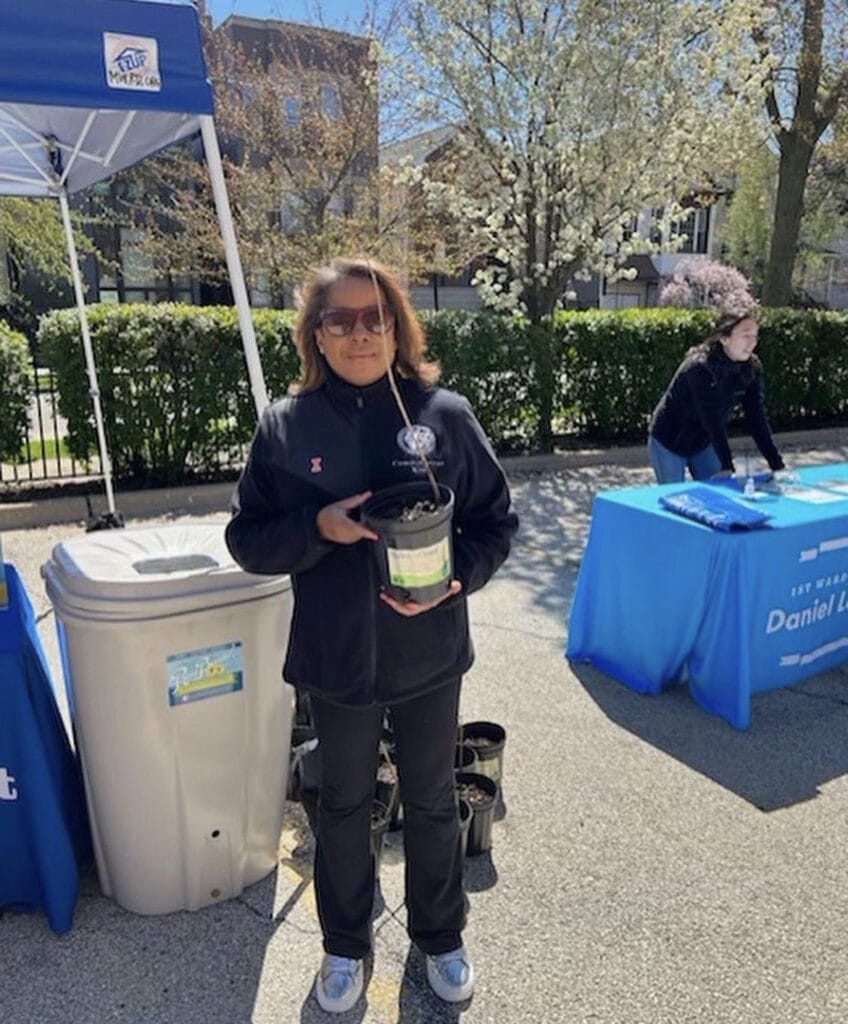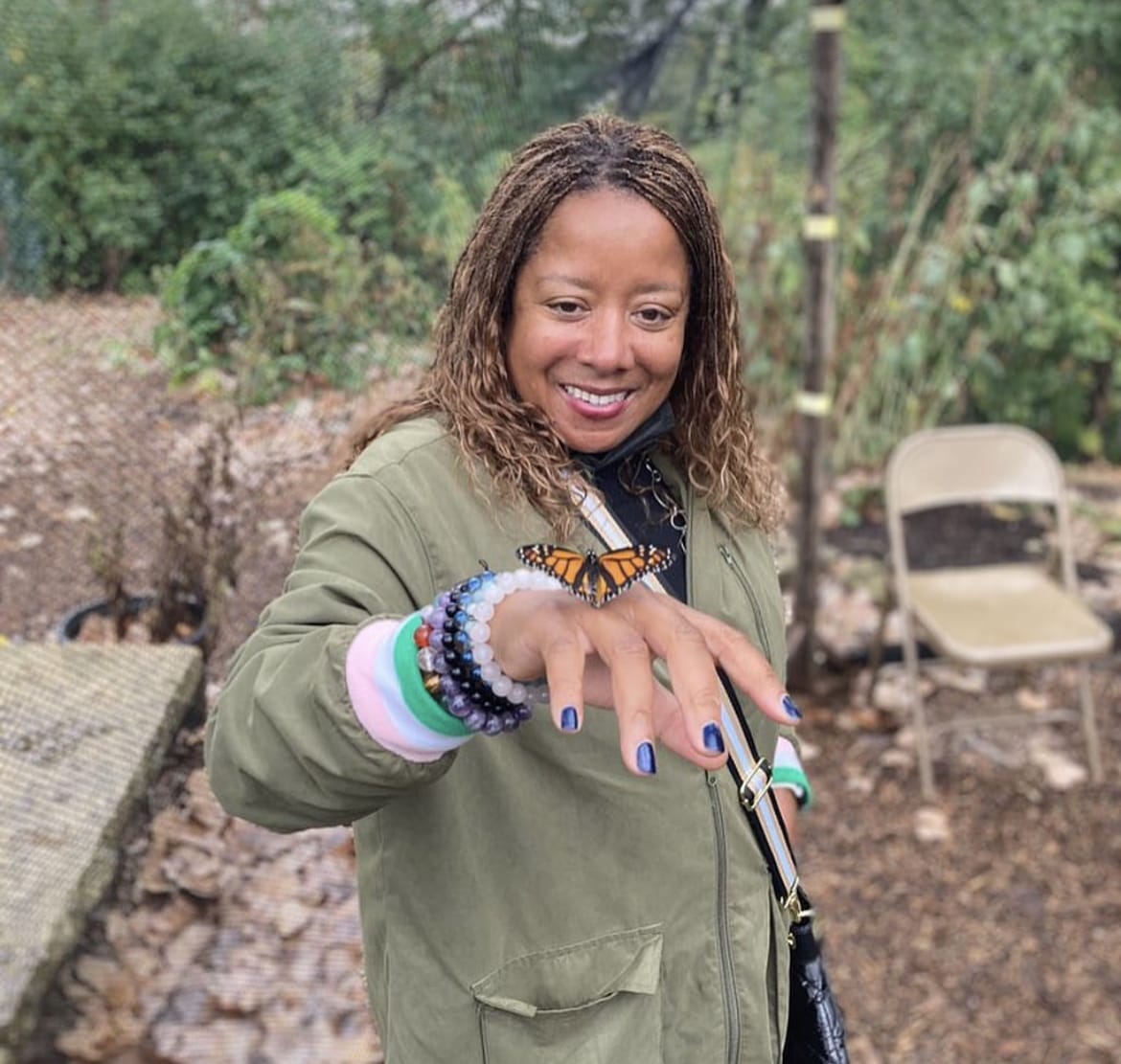Inspired by her parents’ work ethic and commitment to community and family, Cook County Water Reclamation District of Greater Chicago Commissioner (MWRD) Kim Du Buclet is on a mission to protect the county’s fresh water systems, save monarch butterflies and fight the effects of climate change.
Elected to her first MWRD six-year term in 2018 and again in 2020, Du Buclet sat down with the Chicago Crusader to reflect on her work, her upbringing on Chicago’s South Side, and her mission to ensure equity and environmental justice as it informs most of Cook County’s wastewater policies.
Her quest comes at a time when the nation has taken notice of problems with water systems in Mississippi, California, Michigan and local suburban communities.
With increased awareness of threats to our region given the challenges we face due to climate change, Du Buclet’s advocacy has taken center stage in national and local policy discussions on this important issue. Her efforts have not gone unnoticed as she has been recognized and often partners with local environmental groups to discuss the need for long-term solutions to increase sustainability efforts across Cook County.
“I’ve always been concerned about the environment,” Du Buclet reflected, “and I grew up in a home that flooded nearly every time it rained. So as a kid, I was very used to shoveling debris and muck waste out of my basement, putting our washer and dryer and our couch and all of our belongings up on pallets to keep the flooding nasty water and sewage from ruining our items, even though that didn’t really help.
“So I was always concerned, and I always wondered why flooding is happening and later on I began to question why it happens more in the Black and Brown community. Our communities as a whole tend to have poor air quality, poor water quality, poor food quality, and all of these are environmental justice issues.”
She said her parents, Samuel and Doristeen Neely, were loving, working class people who were both active in the Chatham community where they raised their children to respect their elders, study hard and fight for justice even when it seemed the odds were stacked against them.
Her father was not only a precinct captain and actively involved in neighborhood affairs, but also ran the city’s Black-owned gas stations on 87th Street and Stony Island, served as president of the 87th Street Business Association and on the board of a community bank. Her mother was a teacher’s aide in a local Chicago Public School (CPS) district, but also worked part-time in the family business.
“They were working-class people who were just trying to make a living for themselves and their families,” Du Buclet said, reflecting on her late parents.
“I watched my dad get up seven days a week, 365 days a year to manage the station. He’d always come home with all this oil and dirt under his fingernails. He taught me the value of hard work. He taught me the value of family because he was always there for our family and took care of all of us. My father moved to Chicago from Grenada, Mississippi, when he was just 15-years of age, the oldest of 12 siblings, and with maybe a fifth grade education.
“He owned several gas stations, along with his brothers, and that showed me the value of close familial relationships,” she said.
“I grew up close with my cousins. My mom was also hard-working, (and had) great Midwestern values. She was born and raised in Chicago. In addition to working at CPS, she was the business manager for my father, meaning that she would do his payroll and do his books and make the bank run back then. It was primarily a cash business. They didn’t have credit card machines. So she would collect the cash and keep track of the books.”
The youngest of four siblings, Du Buclet attended a neighborhood school before transferring and graduating from the elite University of Chicago Laboratory Schools. After high school she graduated from the University of Illinois at Urbana-Champaign where she earned a BS in marketing.
A member of Alpha Kappa Alpha Sorority, she also earned a Master’s in Business Administration from the University of Chicago Booth School of Business and later worked in a series of jobs in New Jersey and North Carolina, before returning to Chicago, getting married and winding up at the Leo Burnett Advertising Agency.
When asked why she decided to go from marketing to politics, Du Buclet said, “That is an excellent question, and some days I look at myself in the mirror and ask myself the same thing,” she said.
“My first job after business school was with AT&T as a marketing manager. And I worked with them for many years (and then I) took some time off to have a couple of kids and I wanted to figure out what to do with my life.
“I ended up working for my husband at the time and I worked for him for a while when I made the shift,” she said.
“I guess (my interest in politics) started with my dad who was always very involved in politics as a precinct captain. He was always doing behind the scenes (work), door-knocking, and hosting and going to fundraisers for other politicians on the South Side. He was very close to John Stroger, Sr.”
Stroger was a lawyer, a savvy ward boss, and Democratic Party political powerhouse who in 1994 became the first Black president of the Cook County Board of Commissioners. His death on January 18, 2008 at the age of 78 left a gaping void in Chicago’s Black political leadership that has yet to be filled. Only the sudden death in 1987 of Harold Washington, the city’s first Black mayor, hit the Black community harder.
Du Buclet says her own political career began when she decided to fill the vacancy created in the 26th Legislative District when Will Burns left the Illinois General Assembly to become a Chicago alderman.
After her appointment she found her passion of working on environmental issues and criminal justice reform. The Commissioner is particularly proud of co-sponsoring legislation that restricted the disposal of microbeads (often used in bath products) from being dumped into the water supply.
When the term was up, she declined to run for re-election and that seat was won by Kambium Buckner, who is now running for re-election to the General Assembly but has also announced his campaign for mayor of Chicago.
Her commitment to public service was not over. Du Buclet then took a position as the legislative and community affairs director for the Chicago Park District where she worked to improve parks and park programming throughout Chicago. As part of her duties, she monitored legislative activity at all levels of government to assess the impact of proposed legislation on the Chicago Park District.
“I found out about the importance of green space as well as the disparity of parks all over the city,” DuBuclet told the Crusader.
“There was a perception that parks in non-ethnic neighborhoods were cleaner and had more programming and that wasn’t true, but it was a strong perception (in the community). I worked very hard to make sure there was parity within all neighborhoods by working with community groups and with the Chicago Park District. It was probably one of the best jobs I ever had.
“And then our former president (Donald Trump) was elected,” she said. “He started to systematically undo a lot of environmental protections that had been in place for decades. These protections have been in place under Democratic presidents and under Republican presidents. So it really wasn’t partisan. And it became very frustrating to me, because I am an advocate and I fight for the environment.”
Established in 1889, the MWRD is a government agency responsible for wastewater treatment and storm water management in Cook County, Illinois.

While the Chicago Water Department is responsible for the water that flows into homes, businesses, and facilities, Du Buclet’s agency is responsible for what happens when it leaves. [What comes out of the sink (through pipes) is the city’s responsibility, but what goes down the drain (into the sewer) is the Reclamation District’s.] The agency also protects the water environment, mitigates flooding, and manages waterway elevations, and encourages water conservation.
“I tell people it is the agency that touches everyone every day, but it is the least known but most important agency,” she said.
“We prevent waste from getting into our drinking water….We process wastewater, put it back into the Chicago River and it ultimately filters back into the Gulf of Mexico. [The Commissioners] are responsible for setting policy around our wastewater and flooding. I consider my agency as more of a public health environmental agency versus just a wastewater treatment facility.”
With increased focus on the ongoing water crisis in places like Flint, Michigan, and Jackson, Mississippi, and the current infrastructure problems in suburban cities of Dixmoor, Robbins and Maywood, Illinois, respectively, DuBuclet has been steadfast in working with local officials and her own agency to address growing concerns about the delivery and disposal and sanitation of the city’s water.
Though she has no direct role in the delivery of fresh water she collaborates with municipalities to address ongoing issues.
In Maywood for example, officials have been unable to invest in their water infrastructure which loses about nearly 40 percent of its water to leaking valves and pipes at an expense passed on to residents in their water bills. It is one of 1,800 community water supply systems that provide drinking water to more than 12 million people, according to the Illinois Environmental Council (IEC).
This past summer, New York City health officials announced that they discovered the polio virus in wastewater samples, suggesting polio was probably circulating in the city again. The city of Baltimore also had problems with its drinking water this year when E. coli was found in its water supply.

Last week, a British newspaper reported that 80 percent of Chicago households are exposed to lead contamination in drinking water, at levels at or above federal limits. The levels were about a third more lead than allowed in bottled water, and African American and Latino residents were being disparately impacted.
“This means that out of the 24,000 tests, approximately 1,000 homes had lead exceeding federal standards,” The Guardian wrote.
“Experts and locals say these results raise broader concerns, because there are an estimated 400,000 lead pipes supplying water to homes in the city, and the vast majority were not tested as part of the program. Moreover, they say the city is not moving fast enough to eliminate the potential danger.”
In 2018, IEC warned “Illinois has a $32 billion projected need over the next 20 years for drinking, storm water, wastewater infrastructure.”
The group said Illinois has the “highest drinking water project need in the Midwest” and that “it is estimated that one-eighth of all lead service lines in the nation are located in Illinois, and in Chicago alone there may be nearly 450,000 lead service lines. Yet, very few communities are taking the initiative to replace lead service lines.”
Du Buclet told the Crusader the viral contamination recently found in New York and Baltimore was something local public health departments are closely monitoring in Chicago.
“I just had a conversation with a public health expert about polio,” she said. “And so, two things: wastewater surveillance can detect lots of diseases before it actually shows up on our population. So we work closely with public departments at all levels of government, and local universities. We partnered with them during (the pandemic) and enabled them to trace and monitor COVID outbreaks.
“Wastewater surveillance will continue to be an area of focus for our sector as researchers begin to identify other types of illnesses that can be monitored into the future,” she continued.
“MWRD once again is helping address many public health challenges as it did over 130 years ago with the reversing of the Chicago River.”
As chair of the agency’s Federal Legislation and Labor & Industrial Relations committees, Du Buclet also serves as vice chair of the Budget and Employment Committee; Pension, Human Resources and Civil Service Committee; and the Storm water Committee. In addition she serves as trustee of the group’s $1.5 billion pension fund and in October 2021 was appointed to the Public Building Commission.

But she is most excited about the District’s program to save monarch butterflies from extinction.
“Many may or may not know they are going extinct,” Du Buclet said. “And so the district has been on this huge effort to try and save our butterflies by giving away milkweed seeds, which are the only plant that the monarch butterfly will feed on. …The monarch butterfly is almost like a canary in the coal mine.”
As the electorate prepares for the upcoming elections, DuBuclet believes environmental and sustainability issues will be important gauges for Illinois voters.
People are constantly reminded by news reports of droughts and utility issues in states such as California, Nevada and Texas. According to the National Integrated Drought Information System, record heat and dryness in the Central U.S. has led to water degradations in Nebraska, Kansas and Oklahoma. The Northern Rockies and Northern Plains also saw a large expansion of drought this week. As of September 20, 2022, 41.02 percent of the U.S. and 48.91 percent of the lower 48 states are experiencing drought.
As of this writing, some 119.7 million people in the U.S. and 118.7 million in the lower 48 states are affected by drought conditions this week, the federal agency reported. The condition has impacted 274.8 crops at an increase of 22.4 percent in a seven-day period. For animals that rely on grains and grasslands, if these conditions continue, the nation’s food supply could become compromised.
The Environmental Protection Agency (EPA) noted climate change may increase the prevalence of parasites and diseases that affect livestock. The crops, livestock, and seafood produced in the United States contribute more than $300 billion to the economy each year. Changes in the frequency and severity of droughts and floods could pose challenges for farmers and ranchers and “threaten food safety,” according to the EPA.
Du Buclet said, “All of us need to pay attention to climate change and the things that we can do as individuals to help that, especially as you vote for elected officials, as you think about policy, and as you use water in your house.
“There’s going to be at some point in the future a severe shortage of fresh water,” the Commissioner added.
“And, there’s going to be something called climate migration at some point where people are going to migrate towards these freshwater communities. I encourage everyone to think about the importance of water, it is going to be the new gold at some point. And just be thankful and blessed that we have this resource (Lake Michigan) right here at our doorstep.
“We should do everything we can to take care of our water supply and take care of our environment.”
Reporting made possible by the Inland Foundation.






